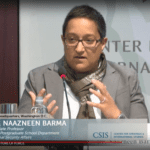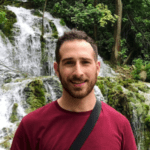Joshua Busby is a Professor in the LBJ School of Public Affairs at the University of Texas-Austin. From 2021-2023, he served as a Senior Advisor for Climate at the U.S. Department of Defense. His most recent book is States and Nature: The Effects of Climate Change on Security (Cambridge, 2023). He is also the author of Moral Movements and Foreign Policy (Cambridge, 2010) and the co-author, with Ethan Kapstein, of AIDS Drugs for All: Social Movements and Market Transformations (Cambridge, 2013). His main research interests include transnational advocacy and social movements, international security and climate change, global public health and HIV/ AIDS, energy and environmental policy, and U.S. foreign policy.
Daniel H. Nexon is a Professor at Georgetown University, with a joint appointment in the Department of Government and the School of Foreign Service. His academic work focuses on international-relations theory, power politics, empires and hegemony, and international order. He has also written on the relationship between popular culture and world politics.
He has held fellowships at Stanford University's Center for International Security and Cooperation and at the Ohio State University's Mershon Center for International Studies. During 2009-2010 he worked in the U.S. Department of Defense as a Council on Foreign Relations International Affairs Fellow. He was the lead editor of International Studies Quarterly from 2014-2018.
He is the author of The Struggle for Power in Early Modern Europe: Religious Conflict, Dynastic Empires, and International Change (Princeton University Press, 2009), which won the International Security Studies Section (ISSS) Best Book Award for 2010, and co-author of Exit from Hegemony: The Unraveling of the American Global Order (Oxford University Press, 2020). His articles have appeared in a lot of places. He is the founder of the The Duck of Minerva, and also blogs at Lawyers, Guns and Money.
Naazneen H. Barma is Director of the Doug and Mary Scrivner Institute of Public Policy, Scrivner Chair, and Associate Professor at the Josef Korbel School of International Studies at the University of Denver. She is a political scientist whose work spans topics including peacebuilding, foreign aid, the political economy of development, and global governance, with a regional focus on Southeast Asia and the Pacific. She is one of the founders and a co-director of Bridging the Gap, an initiative devoted to enhancing the policy impact of contemporary international affairs scholarship. She is currently co-authoring a book that develops a principled and pragmatic roadmap for a modern global liberalism.
Barma's most recent book, The Peacebuilding Puzzle: Political Order in Post-Conflict States, was published by Cambridge University Press (2017). Drawing on fieldwork in Afghanistan, Cambodia, and East Timor, it explains the disconnect between the formal institutional engineering undertaken by international peacebuilding interventions and the governance outcomes that emerge in their aftermath. The book argues that transformative peace operations fall short of achieving the modern political order sought in post-conflict countries because the interventions themselves empower post-conflict elites intent on forging a neopatrimonial political order.
Barma 's research has been supported by the United States Institute of Peace, the Minerva Research Initiative, and the Berggruen Institute among others, and has been published in several refereed journals and edited volumes. She is co-author of Rents to Riches? The Political Economy of Natural Resource-Led Development (World Bank, 2011), as well as co-editor of Institutions Taking Root: Building State Capacity in Challenging Contexts (World Bank, 2014) and The Political Economy Reader: Markets as Institutions (Routledge, 2008). She has also co-authored policy-oriented pieces on global political economic order that have appeared in Democracy: A Journal of Ideas, Foreign Policy, and The National Interest.
Barma received her PhD (2007) and MA (2002) in Political Science from the University of California, Berkeley, and her MA (1997) in International Policy Studies and BA (1996) in International Relations and Economics from Stanford University. From 2007–2010, Barma was a Young Professional and Public Sector Specialist at the World Bank, where she conducted political economy analysis and worked on operational dimensions of governance and institutional reform in the East Asia Pacific Region. From 2010–2020, Barma was a professor in the Department of National Security Affairs at the Naval Postgraduate School in Monterey, California.
Elizaveta Gaufman is Assistant Professor of Russian Discourse and Politics at the University of Groningen, the Netherlands. She is the author of "Everyday Foreign Policy: Performing and Consuming the Russian Nation after Crimea" (2023) and "The Trump Carnival: Populism, Transgression and the Far Right" (2024).
Adam B. Lerner is Associate Professor of International Relations at Royal Holloway, University of London and Deputy Director of Royal Holloway's Centre for International Security (RHISC). His first bookFrom the Ashes of History: Collective Trauma and the Making of International Politics was published by Oxford University Press in March 2022. His refereed articles have appeared in Perspectives on Politics, International Theory, European Journal of International Relations, International Studies Review, Journal of Contemporary Asia, International History Review, andCambridge Review of International Affairs, among other outlets, and his journalistic writing has appeared in Politico, The New York Times, The Pacific Standard, The Caravan, The Print, and In Asia. He is on twitter @adamblerner.
Jarrod Hayes is an Associate Professor of International Relations at the University of Massachusetts Lowell. His research interests include the IR theory, social construction of threat, societal mechanisms of security within democracies, and the social construction of environmental problems. His first book Constructing National Security: US Relations with India and China was published in 2013 by Cambridge University Press and his second, an edited volume entitled Constructivism Reconsidered, was published by University of Michigan Press 2018. He has published articles in numerous scholarly journals including European Journal of International Relations, Foreign Policy Analysis, Global Environmental Politics, International Affairs, International Organization, International Studies Quarterly, Nonproliferation Review, and Security Studies.
Peter Henne is an Associate Professor in the Department of Political Science and Global and Regional Studies Program at the University of Vermont. His research focuses on global religious politics and the Middle East. His first book, Islamic Politics, Muslim States and Counterterrorism Tensions, was published in 2017 by Cambridge University Press and he is currently working on a book analyzing how states try to use religion in foreign policy. His scholarly research has been published in International Journal of Religion, International Studies Perspectives, Journal of Church and State, Journal of Conflict Resolution, Journal of Peace Research, Politics and Religion, Religions, States and Societies, and Terrorism and Political Violence. In addition to the Duck, he has written for the Washington Post's Monkeycage, Political Violence at a Glance and The Huffington Post.






